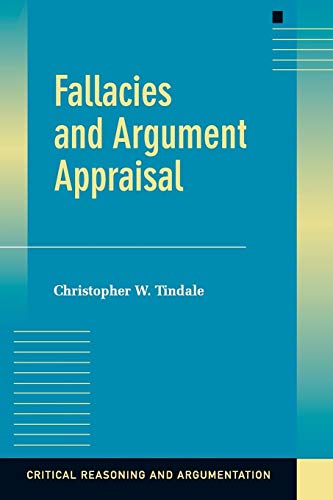Fallacies and Argument Appraisal (Critical Reasoning and Argumentation)
Christopher W. Tindale
BOOK REVIEW

Understanding the art of argumentation and the perils of logical fallacies is crucial in our increasingly complex world. Christopher W. Tindale's Fallacies and Argument Appraisal (Critical Reasoning and Argumentation) presents not just an academic treatise but a vital toolkit for navigating the murky waters of persuasion, debate, and critical thinking. This work challenges you to dissect the very fabric of arguments around you, exposing the often-invisible threads that, when pulled, reveal deeper truths or misleading rhetoric.
Tindale's profound exploration dives into the mechanics of fallacies, making the invisible visible and the convoluted comprehensible. With each chapter, he intricately unpacks the various forms of fallacies that pervade our discourse, be it in political speeches, social media, or casual conversations. This is not just an academic exercise in noun-based logic; it is a clarion call for intellectual vigilance-a demand to sharpen our cognitive skills and defend ourselves against the tide of misinformation that threatens to drown rational discourse.
Readers often praise Tindale for his clear, accessible prose. He transcends the dry, pedantic tone typical of academic texts and instead breathes life into the subject matter. Yet, some critics argue that while his analysis is insightful, it occasionally lacks the compelling argumentation it advocates for. Nevertheless, the practical examples he provides allow readers to contextualize the fallacies in everyday life, making it a crucial companion for students and professionals alike.
What does it mean to internalize this knowledge? It implies a transformation whereby you can no longer passively consume information. Rather, you become an active participant in the discourse, armed with the knowledge to dismantle erroneous reasoning. Consider how this could revolutionize your conversations. Seize control of dialogues that seem to spiral into confusion or misinformation; Tindale equips you with the means to challenge assumptions and elevate discussions to a higher plane.
This text comes at a critical juncture in society, where arguments seldom tether themselves to rational thought. Tindale's work resonates strongly within the context of contemporary issues-fake news, online trolling, and the rampant proliferation of disinformation. By revealing the mechanics behind common fallacies, he ignites a fire within you to question not just what is being said, but how it is being said. The impulse to dissect and appraise arguments becomes innate, like a second language in a world teeming with rhetoric.
Let's not forget the historical background against which Tindale writes. Since the turn of the millennium, our collective engagement with information has transformed dramatically due to digital advancements. The implications are dire-our ability to reason critically has been tested in ways previously unimaginable. Tindale's piece stands as a beacon of hope, reminding us that while fallacies may abound, so do the tools needed to discern them.
In a striking moment, a reader shared their realization after engaging with Tindale's arguments: "It's like stepping onto a battlefield armed with armor you never knew existed." This representation of personal empowerment reflects the wider impact of the book. Tindale doesn't merely espouse theory; he inspires action. This isn't mere criticism; it's a rallying cry for all who dare to think critically.
What happens when this knowledge seeps into your everyday interactions? You begin to perceive the cracks in others' arguments, the hidden assumptions, the bait-and-switch tactics. Discussions morph from mundane exchanges to stimulating intellectual duels. Your confidence grows because with each analyzed claim, you're not just responding; you're constructing a nuanced stance.
In observing the broader influences, consider figures like philosopher Daniel Dennett and cognitive scientist Steven Pinker, both champions of critical thinking and rational discourse. Tindale's message echoes in their works, emphasizing the importance of understanding argumentation in traversing the complexities of modern thought.
In a world driven by rapid-fire exchanges and superficial engagements, Fallacies and Argument Appraisal has become a necessary companion for anyone aiming to reclaim their voice and clarity in discussions. It compels you to dive deeper, to challenge norms, and to emerge more informed. Don't simply read this book-immerse yourself in it. Let it stir you, provoke you, and inspire you to engage with ideas as a warrior of reason. The battle against fallacies is not just about winning an argument; it's about cultivating a world where reason prevails, and rhetoric never overshadows truth. 🌟
📖 Fallacies and Argument Appraisal (Critical Reasoning and Argumentation)
✍ by Christopher W. Tindale
🧾 238 pages
2007
#fallacies #argument #appraisal #critical #reasoning #argumentation #christopher #tindale #ChristopherWTindale